Reply To:
Name - Reply Comment
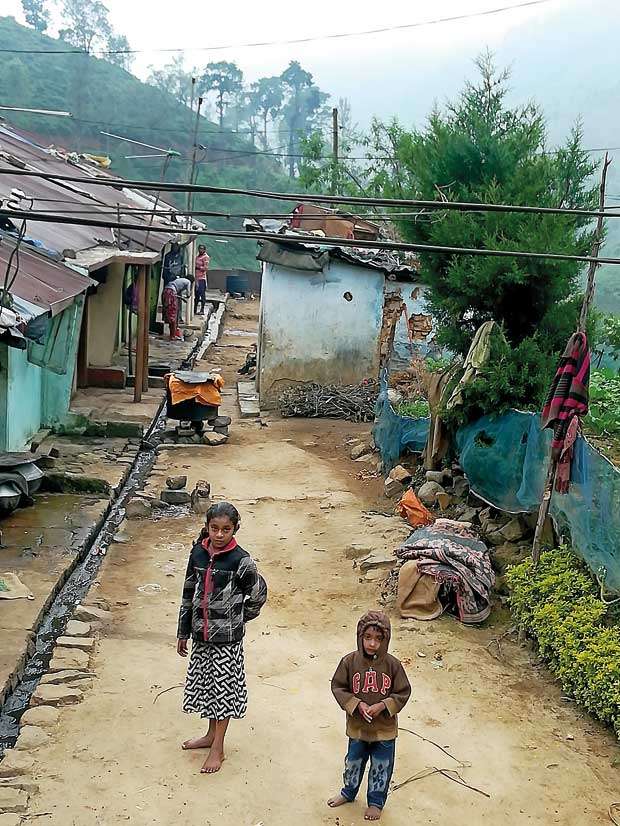
Line houses of tea plantation workers in Ragala, Badulla - Pix by Piyumi Fonseka

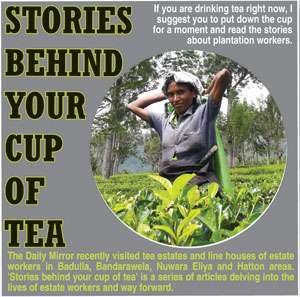
Although the income generated through tea- which is one of the main crops in the island- is beneficial for our economy and the big companies owning plantations, it has hardly any significance on the lives of tea plantation workers who still remain as one of the most poorly paid workers in the organised sector.
“The tea companies have been making millions every year while we live an inhumane life. We work to protect the tea industry, but the salary is too scanty to provide minimum requirements for the family,” fifty-four year-old Sinnathambi, a labourer attached to the Badulla Wewessa Tea Estate told the Daily Mirror.
“Politicians came during election times and promised us to create a better future for our children if we cast votes in favour of them. But it was all lies,” Sinnathambi complained.
With terribly low wages, these workers face a daily struggle to survive and have no means of enhancing their lives. And with poor access to education, some of their children are left with no option, but to become workers in estates themselves.
Today they barely manage to live by the wages they earn, many of them going to bed half-fed.
A report issued by the World Bank recently said that families living on estate plantations remain markedly disadvantaged, and districts with a high percentage of tea estates have the highest rate of stunting among children under five.

“Sometimes, we cannot find enough tea leaves even to meet the target. I have even received Rs. 4000 as my monthly salary - Rashani Kumari
“Most of the tea estate workers are passing days half-starved. We can hardly meet our family needs, including children’s education,” Sinnathambi added.
The tea workers in the country have long been demanding a salary hike to make their income on par with labourers of other sectors, but their call almost always went unheard.
Since the inception of the tea industry back in 1867 in Sri Lanka, it has played an important role in terms of its contribution to the foreign exchange earnings. It should also be noted that some areas in the industry have undergone a number of changes over the decades.
Mainly, the ownership of tea lands has changed from privately-owned large scale tea plantations to nationalized tea plantations managed by the state, and to the present day regional plantation companies owned by private companies.

Two estate workers, wearing UNP caps captured smiling to the camera
Despite developments in the industry, the workers’ living conditions remain unchanged with no impactful developments taking place. Tea workers’ salaries are revised once every two years. The two-year collective agreement between regional plantations companies (RPCs) and unions, was to be renewed on 15 October 2018.
As the two-year collective agreement lapsed recently, negotiations for another wage increase in the plantation sector has begun. However, no agreement has been possible despite three months of talks.Plantation companies delayed the salary increase due every two years in 2015 by 18 months stating that plantation companies were making losses. But workers didn’t receive the arrears. After a delay of 18 months their basic salary (per day) was increased by merely Rs. 50 in 2016. With that their basic salary which was Rs. 450 was raised to Rs. 500. Between 2005 to 2018, the basic salary of a plucker has been increased only from Rs. 365, the special allowance from Rs. 10 and incentive payment from Rs. 175.
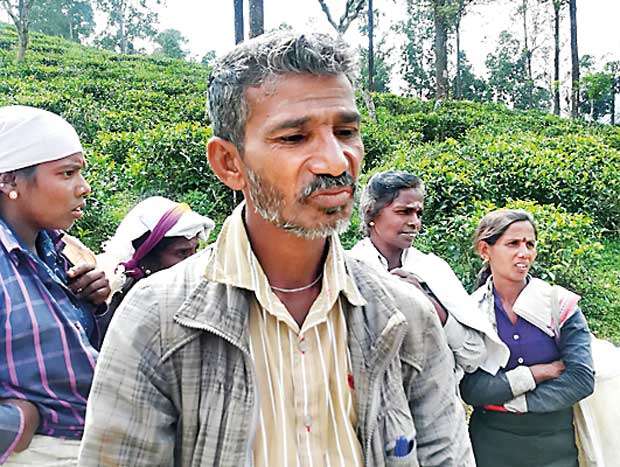
Rice has gone up to Rs. 100 and even more. It is impossible to meet our daily needs with this salary. Our children have no future - S. Dorewel
The only demand of the estate workers is to increase their daily minimum wage to Rs. 1,000. Not only is the wage low, but some labourers also have to sweat throughout the day. Therefore, it was clear that tea pickers are getting a raw deal. When Sinnathambi started working in the estate in 1982, his basic salary was Rs. 18. After years of struggles and demands, their basic salary had been increased to Rs. 500. He works six days a week. Apart from the six days, if he works on Sunday, he gets Rs. 500. Tea pluckers and labourers attached to the estate earn the same basic salary although the work assigned to them is different in nature.
The salaries of estate workers are credited to their bank accounts every month. In addition to the basic salary of Rs. 500, they are also given an allowance of Rs. 200. Those who pluck tea leaves in excess of the daily target are offered Rs. 30. However, if the worker fails to meet the daily target, a total of Rs.230 is deducted from the salary.
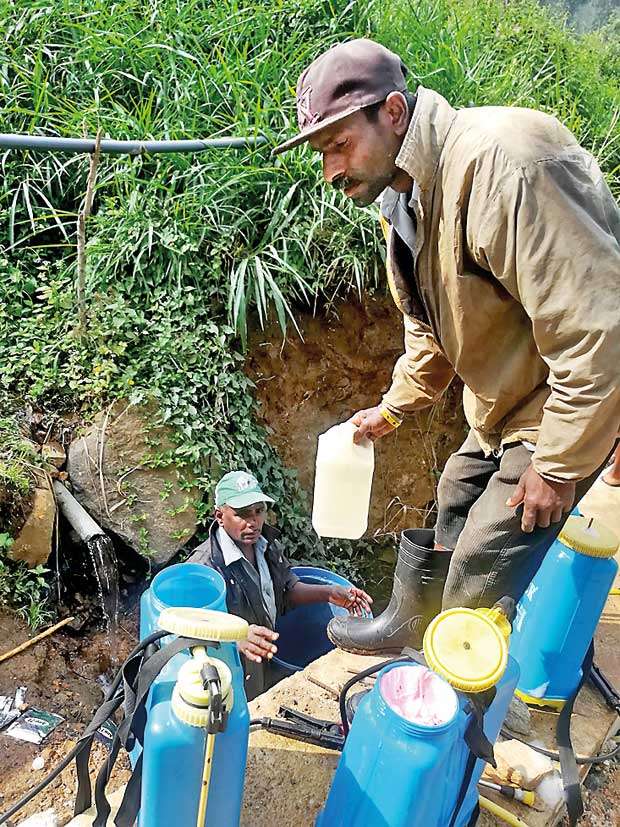
Estate workers, having no protection kits, mixing water with chemicals and pesticides
Rashani Kumari (33) from same estate said that if they cannot meet the daily target, planters cut their pay. “Sometimes, we cannot find enough tea leaves even to meet the target. I have even received Rs. 4000 as my monthly salary. How can we live? We have children and need at least 20,000 rupees a month for their education,” said Rashani. Considering the wages these estate workers earn in Badulla, Bandarawela, Walapane, Ragala and Nuwara eliya areas, the Daily Mirror learned that although the workers work 26 days a month, the maximum salary each worker can earn does not exceed Rs. 18, 000. It was also learnt that most often the workers find it impractical and impossible to even meet the target set for them.
S. Dorewel said the increments made to the salary are not adequate compared to the rising cost of living. “Those days a kilo of rice was Rs. 2.50 and our salary was Rs. 72. Nowadays a kilo of rice has gone up to Rs. 100 and even more. It is impossible to meet our daily needs with this
salary. Our children have no future,” he said.
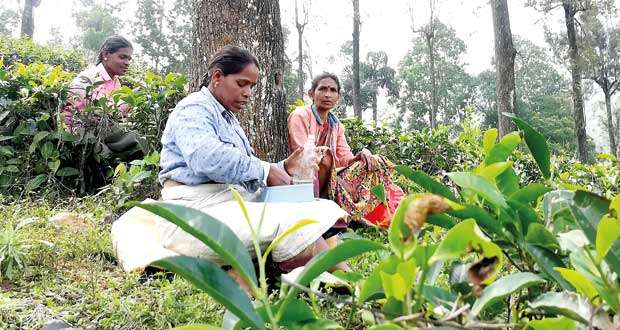
A group of female plantation workers having their meals under a tree in a tea plantation
Dorewel is a father of five. He said it is difficult to meet the expenses of the family given the poor financial situation. Although there seems to be a stereotypical thought that all the plantation workers are Tamil, the Daily Mirror met Sinhalese and Muslim estate workers as well. Somawathi (48), from Badulla Wewessa Tea Estate said they want the Government to intervene and provide a permanent solution.
“We can’t tolerate this burden with the cost of living. Our wages are not even enough to buy the food we need and we don’t have enough money to pay for our children’s education. We are forced to borrow money. This time we can’t accept less than 1,000 rupees per day. We voted for this Government, but they forget us,” Somawathi said.

The daily wage model is 150 years old and it does not encourage or motivate productivity because workers reach the minimum target - Roshan Rajadurai
They often work long hours with little access to health and safety protection; sometimes not even having potable water. Those who spoke with the Daily Mirror from estates in Badulla and Nuwara Eliya said that the planters are not concerned about the welfare of workers.
As a consequence, those involved in accidents at the workplace or down with diseases caused by working conditions remain untreated and leave the workers incapable of continuing with work. This means that workers who lose their jobs are immediately left without job security.
Sinnathambi, from Badulla Wewessa Estate said; “during the months of May and June, stings by bees and wasps are common. We don’t have any protection to prevent such attacks during work. Even when we get attacked, we have to stay in hospital for two weeks to obtain the sick benefits”.
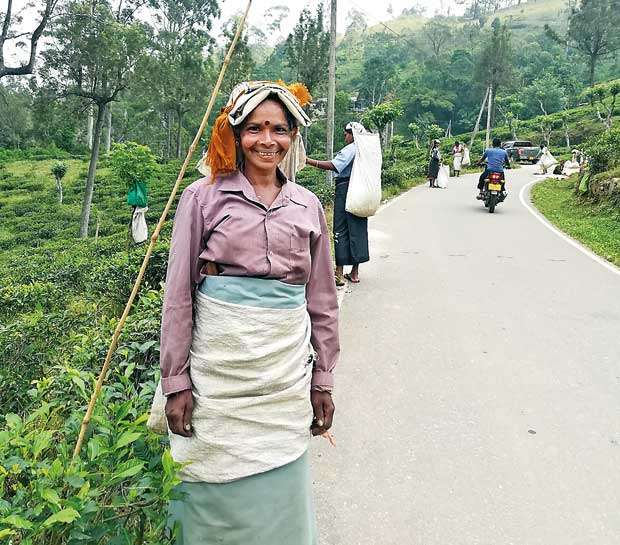
In the tea plantation sector, workers’ safety and security issues are ignored widely. All the estate workers interviewed by the Daily Mirror stated that their health and safety were at risk because of their work. They identified multiple reasons including having no shelter close to the workplace, safety kits, toilet facility despite having to put in long working hours in a harsh environment which expose the workers to the risk of snake bites and poisonous chemicals.
“The men who spray chemicals on the tea plants are not given at least a mask,” Sinnathambi added. Attention should be paid to improve the tea industry which is strongly linked to the well-being of tea plantation workers.
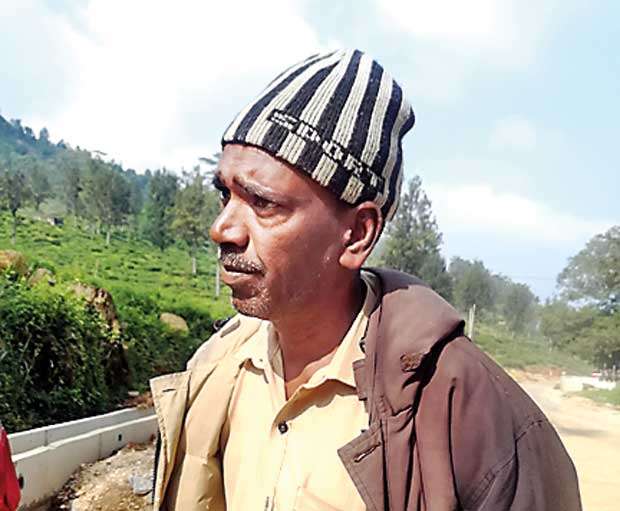
Meanwhile, it was reported that tea exports fell by 8.6 percent in November while the tea production recorded a marginal decline overshadowed by unfavourable weather conditions with production being disrupted due to trade union actions in the estates managed by Regional Plantation Companies (RPCs).
According to the Sri Lanka Tea Board (SLTB), tea export volumes dropped by two million kilogrammes (M/kg) to 21 M/kg in November, while tea production fell by a marginal 0.2 M/Kg or 0.8 percent year-on-year (YoY) to 24.7 M/Kg in November.
In this background, the planters have come up with a suggestion to re-examine the concept of ‘Performance-linked wages’. This particular concept was discussed two years ago when the last wage increase negotiations were on.
Speaking to the Daily Mirror, Employers’ Federation of Ceylon Plantations Group Chairman Roshan Rajadurai said the cost of tea production is too high and that they cannot afford to pay Rs. 1000 per day for a plantation worker.
“We are professionals and we cannot act like politicians and promise what we cannot do. We can afford to pay the salaries according to the income we earn from the Colombo auction. Cost of production is already higher than the revenue. The daily wage model is 150 years old and it does not encourage or motivate productivity because workers reach the minimum target and hence receive the daily wage,” Rajadurai said.
“We have offered a viable option for them. With productivity based model, they can earn as much as they can. I don’t understand why the trade unions don’t agree with our suggestion. This is just a political drama.” He warned that the Sri Lankan tea industry is on the brink of collapse because the productivity of the tea plantation workers of countries like India and Kenya is higher than Sri Lanka.
Although the increasing productivity is a desirable objective, the concept gives no regard to the quality of work; for instance there being no regard if the target was achieved or whether the employer emerged satisfied. However, the authorities should take action to grant the tea planation workers a ‘living wage’ that is necessary for them to at least meet their basic daily needs.
Their salaries are low, often being below the poverty level. They are isolated from the rest of the country as a different and disadvantaged community.
In the next articles, ‘Stories behind Your Cup of Tea’ will uncover how terribly dependent the plantation workers are on their employers, not just for their jobs, but for their homes and schools their children attend, medical facilities and transport.